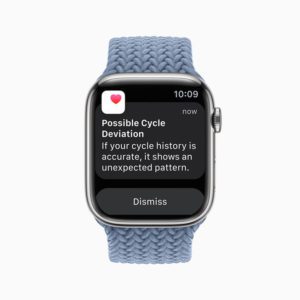Apple unveiled its flagship devices for 2022 this week, marking an annual September tradition for the tech giant. And while its newest iPhones were iterative, modest improvements over last year’s models, Apple’s new smartwatches delivered a very timely health-focused upgrade.

The most notable new feature of the Apple Watch Series 8 may be its dual temperature sensors, fulfilling a prediction made by Bloomberg’s renowned Apple expert, Mark Gurman, made this past spring. One of the sensors is situated on the back of the smartwatch, nearest to a user’s skin, while another is under the display.
Together, the sensors are designed to collect temperature data that primarily pertains to menstrual cycles. The sensors are meant to track temperature changes during sleep, and can provide retrospective ovulation estimates to users in the morning, offering improved period predictions and a potentially useful tool for family planning.
Apple first introduced a Cycle Tracking app for its smartwatch back in 2019, so the company isn’t quite breaking new ground with respect to the Apple Watch Series 8’s new sensor system. But its arrival shows Apple’s intensifying focus on health tracking as its flagship wearable continues to be outfitted with enhanced sensor capabilities over time.
The timing of its arrival, meanwhile, is eyebrow-raising. In America, reproductive health has been a particularly fraught political and legal issue since the Supreme Court’s ‘Dobbs’ ruling invalidated Roe v Wade, the country’s previously enshrined protection for the right to access abortion. The ruling prompted new concerns about data privacy and what kind of access law enforcement authorities might demand to data from health and, indeed, menstrual-tracking apps.
For its part, Apple has positioned itself as a champion of data privacy as part of its brand, and has even become downright notorious for its dedication to privacy thanks to legal battles with government authorities over access to the iPhone data of domestic terrorists.
In announcing its new Apple Watches, the company noted that privacy is “fundamental in the design and development” of Apple products and services.
“Any Health data backed up to iCloud is encrypted both in transit and on Apple servers,” the company noted. “When using iOS and watchOS with the default two-factor authentication and a passcode, Health app data synced to iCloud is encrypted end-to-end, meaning that Apple does not have the key to decrypt the data and therefore cannot read it.”
Sources: Apple, Axios, Engadget, Bloomberg Law

Follow Us